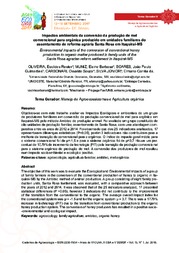Impactos ambientais da conversão da produção de mel convencional para orgânica produzido em unidades familiares do assentamento de reforma agrária Santa Rosa em Itaquiraí-MS.
Impactos ambientais da conversão da produção de mel convencional para orgânica produzido em unidades familiares do assentamento de reforma agrária Santa Rosa em Itaquiraí-MS.
Author(s): OLIVEIRA, E. R.; MUNIZ, E. B.; SOARES, J. P. G.; CARBONARI, O. S.; SILVA JUNIOR, E. C. da
Summary: Resumo:Objetivou-se com este trabalho avaliar os Impactos Ecológicos e ambientais de um grupo de produtores familiares em conversão da produção convencional de mel para orgânico em Itaquiraí-MS pelo método Ambitec de produção animal. Foi avaliado um grupo constituído de oito unidades de produção familiar, assentamento de Santa Rosa, com uma abordagem com-parativa entre os anos de 2012 a 2014. Foi observado que dos 25 indicadores analisados, 17 apresentaram diferenças estatísticas (P<0,05), porém 3 indicadores não contribuíram para a melhoria da transição do convencional para o orgânico. O índice de impacto geral médio para o sistema convencional foi de μ=-1,5 e para o sistema orgânico foi de μ=3,7. Houve um per-centual de 17,79% de incremento da tecnologia (PIT) pela transição da produção convencional para o sistema orgânico de produção de mel. A conversão dos produtores de mel resultou num impacto socioambiental e ecológico positivo. Abstract: The objective of this work was to evaluate the Ecological and Environmental Impacts of a group of family farmers in the conversion of the conventional production of honey to organic in Ita-quiraí-MS by the Ambitec method of animal production. A group consisting of eight family pro-duction units, Santa Rosa tsetlement, was evaluated, with a comparative approach between the years of 2012 and 2014. It was observed that of the 25 indicators analyzed, 17 presented statistical differences (P <0.05), however 3 indicators did not contribute to the improvement of the transition from the conventional to the organic. The average overall impact index for the conventional system was μ = -1.5 and for the organic system μ = 3.7. There was a 17.79% increase in technology (PIT) due to the transition from conventional production to the organic honey production system. The conversion of honey producers has resulted in a positive socio--environmental and ecological impact.
Publication year: 2017
Types of publication: Paper in annals and proceedings
Unit: Embrapa Cerrados
Keywords: Agricultura Familiar, Ecologia, Itaquirai, Mato Grosso do Sul, Mel, Produção Orgânica
Observation
Some of Embrapa's publications are published as ePub files. To read them, use or download one of the following free software options to your computer or mobile device. Android: Google Play Books; IOS: iBooks; Windows and Linux: Calibre.
Access other publications
Access the Agricultural Research Database (BDPA) to consult Embrapa's full library collection and records.
Visit Embrapa Bookstore to purchase books and other publications sold by Embrapa.

